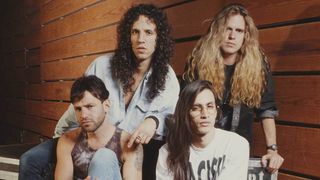Gary Cherone can pinpoint the exact moment his band peaked. It was just after five in the afternoon on Easter Monday, 1992, and Extreme were about to step on stage in front of 80,000 people at Wembley Stadium and several hundred million more on television screens around the world.
The Boston band were the second act to play at the Freddie Mercury Tribute Concert, a celebration of the late Queen frontman’s life featuring an A-list line-up of bands he had inspired. Extreme were a logical choice – they had grown up listening to Queen, and that band’s sense of ambition and fun pulsed through their music. But they were also there on commercial merit. The success of their hit ballad More Than Words and its kaleidoscopic parent album, Pornograffitti, had lifted them far above the MTV-rock pack.
Backstage they’d rubbed shoulders with their heroes: Brian May and Roger Taylor, Robert Plant, Elton John and Roger Daltrey, the latter telling the gobsmacked foursome that Extreme were his daughter’s favourite band. As he walked on stage to launch into a Queen medley, Cherone knew it wouldn’t get any better than this.
“That was the greatest day of our collective lives,” he says. “I almost can’t believe we got there. I ended up singing Hammer To Fall with the surviving members of Queen. That show really was the pinnacle.”
And so it proved to be. Extreme’s profile would never scale the same heights again, and nor would their record sales. And while they never faced immediate extinction like so many of their peers, they eventually fell under the crushing wheels of musical progress. Today, more than 20 years after they split and a decade since they got back together, Extreme and Pornograffitti alike represent the best of their era – a time when bands were given a chance to breathe, explore and grow.
“Those days are gone,” says a stoic Cherone. “But they were damn fun while they lasted.”
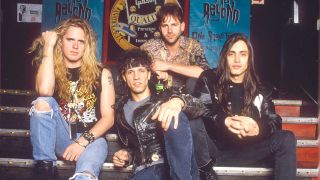
Once upon a time, Extreme were an underground band. Not in the tattooed squat-punk, didgeridoos-and-dreadlocks fashion. But in their hometown of Boston, a musical jungle ruled by the awkward, cerebral college rock of Pixies, Throwing Muses and the Lemonheads, they were an alternative to the alternative. Big of hair, flashy of guitar, fierce of ambition, their territory was clubs with names like Narcissus, The Rat Skeller and The Channel.
“When they let us all out at one o’clock in the morning, we’d all end up in this one place, the Pizza Pad,” says Nuno Bettencourt. “All the college kids would be there. And of course there’d be a lot of fights, but it was fun. That’s what made Boston.”
Extreme were different from the rest of Boston’s rock fraternity, even the bands who were playing the same strain of rock as they were. They had the hair (and the ill-advised headbands to match). In Nuno Bettencourt, they had a bona fide guitar-hero-in waiting. But they also had the sort of vaulting ambition that set them apart.
“We were the bastard children of Queen, Aerosmith and Van Halen,” says Cherone. “Yeah, we looked the part. But we were never a party rock band. That stuck with us for a few years.”
Still, every dog has its day. Having exhausted all possibilities in Los Angeles and New York, the laser eye of the music industry cast its gaze further afield. Eventually it settled on Boston, and on Extreme in particular. What happened next was a textbook Music Industry 101: band gets signed, band records an album, label sits on album, album emerges a year later than it should have. Extreme were deflated but undaunted.
“We signed that deal on air on a radio station, we’re bragging to everybody that our career is gonna take off,” says Bettencourt. “We start recording the album and we don’t like the way it sounds and the record company’s not happy with it. They tell us they’re gonna hold off on it because we missed all these deadlines. We went into this depression.”
The label had a point. Extreme’s self-titled debut album wasn’t that great. Co-produced by Queen associate Reinhold Mack, it had its moments – Kid Ego and the Mozart-referencing Play With Me indicated they had the chops and, when they put their mind to it, the tunes – but it was just too prim for its own good. It sold 300,000 copies in the States. Massive numbers today, but barely enough to cover the catering on a video shoot back then. What happened next is the perfect illustration of the difference between the music industry now and the music industry then.
“The label were telling us, ‘You’ve reached a quarter of a million people – that’s a lot’,” says Bettencourt. “I was bummed, but they were right.”
Rather than slinking back to Boston with their tails between their legs, Extreme were given another chance. They seized it with both hands.
“When the first album was delayed, I said ‘Fuck it’ and kept writing,” says the guitarist. “By the time the first album came out, Pornograffitti was eighty or ninety per cent finished. Instead of crawling into a hole and moping, it gave us a different headspace. It was, like, ‘Fuck you – we’re nobody again.’ That’s why that album was so intense.”
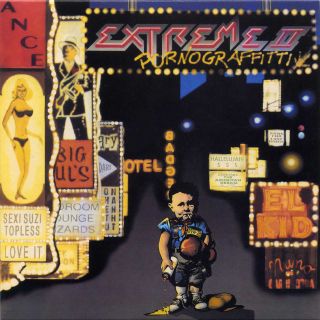
Nuno Bettencourt insists that he didn’t know there was “a funk-metal thing going on” when his band released their second album in 1990. “I thought we were one of the bands initially playing it,” he says. But it was precisely that “thing”, as headed up by the likes of Faith No More and the Red Hot Chili Peppers, that gave Extreme the leg-up they needed.
That album, Pornograffitti (or Extreme II: Pornograffitti (A Funked Up Fairytale)to give it its full and partially mis-spelt title), was and is Extreme’s masterpiece. In Cherone’s words, the band were “full of piss and vinegar” when they wrote it. That might be true, but it doesn’t show. Pornograffitti was by turns playful, earnest, riotous, fun and – yes – funky.
Let’s step out of the story for a moment. If you’re coming to Extreme for tales of hedonism or substance abuse or studio trashing or even great anecdotes, then you’ll be disappointed. They were far too slick for that. Nor, if we’re being honest, will you get much insight into the creative process behind the songs themselves.
But the fact remains that Pornograffitti was the point when Extreme went from bit-part players to leading men. Like many American bands, they benefited from Britain being an early adopter. While they were still largely ignored in their home country, the UK clutched them to its bosom. The song that broke them here was self-explanatory dancefloor filler Get The Funk Out.
“If someone says, ‘I’m gonna kill your whole family but you have one song to show me who you are and save them’, then I’d just put on Get The Funk Out,” says Bettencourt. “It has all the elements: a funk riff, harmonies, a horn section, the kitchen sink. The first time I met Brian May, the first thing out of his mouth was, ‘Hey, Get The Funk Out – who writes a riff like that?’ Maybe it was because I was writing it like a horn section?”
But Get The Funk Out was a gnat on the arse of an elephant next to the follow-up single. More Than Words was a stripped-back acoustic ballad built on Cherone and Bettencourt’s heavenly harmonising. More Everly Brothers than Toxic Twins, it became their first (and only) US No.1. It didn’t just turn Extreme into stars, it turned the singer and guitarist into housewives’ favourites.“If I had a dollar for everyone who told me they’d got married or conceived a baby to it, I’d be richer than Bill Gates,” says Bettencourt. “The label didn’t want to release it as a single. I had to fight for it.”
The song was both a curse and a blessing. It also pegged them as sappy, doe-eyed balladeers (which in fairness, they were – even if it was one part of a much bigger picture). But its success also gave them the freedom to do what they wanted. Which in itself brought its own problems.
“We were pretty cocky to start with, and we got cockier and more aggressive,” says Bettencourt. “Like, ‘Now the work really begins.’ I was on the road writing. I’d have a suite with an adjacent room with a drumkit, a bass rig, a keyboard rig. I was out of my mind: [aggressively] ‘Okay, let’s show ’em what we got.’ Immaturity and youth…”
“Nuno and I were always trying to write the next song,” says Cherone. “It would have been nice if we smelt the coffee a little bit more during that time. There were no drugs, nothing to get people distorted. We always got on. It’s just that you put four guys in a bus for that long and you get burnt out.”
That was in the future. Firstly, there was the follow-up to Pornograffitti to record. And they were determined to push things as far as they could go.
“Be careful what you wish for,” says Cherone. “‘What do you mean we can get a 75-piece orchestra at Abbey Road?’.”
Their third album, Extreme: III Sides To Every Story, was the sound of a band over-reaching themselves. Informed as much by Bettencourt’s love of Genesis and Yes as it was Aerosmith and Queen, it was epic in scale and ambition. Too epic, as it turns out.
“We had all this material, there were themes running through the lyrics, so I said, ‘Let’s try and put together a concept album.’ Yeah, we were ambitious. It came out in 1992, that’s when Nirvana’s stripping down the whole world.”
Even at the time, it was obvious that III Sides didn’t stand a chance. It wasn’t, strictly speaking, a flop. But Extreme found themselves quickly slipping from the lofty peak that Pornograffitti had placed them on.
“On a personal level, it did affect us,” says Cherone, “because we thought it was the better record. But as you grow up, you realise that life’s not fair. It might have had better songs, better production, better singing and playing, but it was Pornograffitti that struck a chord at the time.”
- The Top 10 Best Hair Metal Videos
- Opinion: Enough with the Dio hologram – let the dead stay dead
- The Top 10 Essential 80s Prog Albums
- Ronnie James Dio hologram debuts at Wacken
Extreme put out one more album, 1995’s dark Waiting For The Punchline, which was almost as fatalistic as its title. For most bands that rose to prominence in the late 80s, the first half of the 90s was a killing floor. Extreme lasted longer than most, but eventually they succumbed. When Bettencourt decided to make a solo album, it dawned on him that he’d rather be doing that than playing with Extreme. Though when the end did come in 1996, it came with a smile and a polite handshake.
“Nuno called me up and asked, ‘What would you think if I said I wanna quit the band?’,” says Cherone. “I always wanted to keep Extreme together but I couldn’t force him to be in the band. So I said, ‘Go do your thing.’”
And that was that, except what happened next was kind of interesting. The singer barely had time to mourn the death of the band he’d been in for ten years when he received a call from Van Halen, asking him to replace Sammy Hagar. With Bettencourt’s encouragement, Cherone accepted. He should have been overjoyed. Except he was still hurting.
“I was heartbroken that Extreme broke up,” he say. “I look at the some of the Van Halen photos early on and I was not in a good state of mind.”
He was aware that the task of filling the shoes of Hagar and Dave Lee Roth was never going to be easy. And so it proved. “Eddie and Alex embraced me and they challenged me, but I knew it was going to be short-lived,” he says. “The record [1998’s poorly-received Van Halen III] fell short, but the tour was great. I came out of it knowing that someday Extreme was going to get back together.”
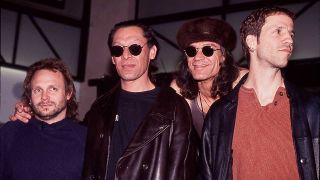
The only issue was that they weren’t, at least not when Cherone left Van Halen in 1999. Bettencourt had fared no better. The guitarist’s solo album, 1997’s Schizophonic, made little impression. Separately, they passed through countless bands: Tribe Of Judah and Who tribute band Amazing Journey (Cherone), Mourning Widows, Population1, DramaGods and the Perry Farrell side-project Satellite Party (Bettencourt). None came close to their old band’s success. (Ironically, the one member who did make a go of things was bassist Pat Badger, who bought and ran a successful alpaca farm with the money he’d made.)
The four members had stayed in touch through their period of musical estrangement, and even got back together for a handful of shows in 2004 and again in 2006. When the full-blown reunion happened in 2007, it was no surprise to anyone. A new studio album, Saudades de Rock – roughly ‘The Nostalgic Yearnings Of Rock’ in Portuguese – followed in 2008.
“Did I miss Extreme? Always. Of course,” says Bettencourt. “It’s your baby. All we needed was a smack in the face. Someone telling us, ‘Hey, idiot, do your thing then come back to Extreme.’”
There were a few residual issues, but they were worked through (original drummer Paul Geary is no longer with the band, though that’s largely because he has his hands full managing the likes of Alter Bridge). Even with the band reactivated, the members have their own parallel endeavours. Cherone formed Hurtsmile with his brother Markus, releasing an album in 2011. Pat Badger sold his alpaca farm and is recording a solo album.
Most remarkably of all, since 2009 Nuno Bettencourt has been the touring guitarist for pop icon Rihanna. “A guy named Tony Bruno, who was her music director, asked me to play guitar on a promo tour,” he says. “There’s no guitar on most of her songs, so I get to do what I want to.” And was she a fan of his band? “No, I don’t think so. I don’t think she was even born.”
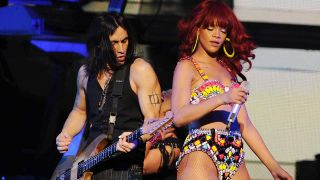
Seven years after from the reunion, the three original members of Extreme played Pornograffitti from start to finish, in much the same venues as they headlined first time around. There is a new album due at some point in the future.
“The band is better than it ever was,” says Cherone. “We’re better players. We’re not in our Fat Elvis period. Not yet.”
Unsurprisingly, they have no problems revisiting the songs that made them famous. Even More Than Words, the great albatross-that-never-was.
“An albatross?” says Bettencourt. “Let’s look at it both ways. On the one hand, we wrote it, it sells millions and we play to millions, we’re still doing it today. On the other hand, we never wrote it, we never released it, I’m working at Burger King selling two burgers for a buck.” He raises an eyebrow. “Let me see…”
